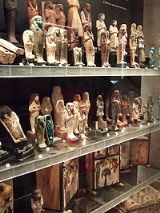
Ushabti
WiktionaryText
Etymology
From Egyptian wšbty (“answerer”), replacing šwbty, perhaps from šwɜb (“persea wood”), perhaps the original material.
Noun
- in ancient Egypt, a figurine of a dead person, placed in their tomb to do their work for them in the afterlife
- 1886, The Times, 1 Sep 1886, p.13 col. A:
- These little images were called in Egyptian “Ushabti,” or “Respondents,” and were in fact supposed to act as servants of the deceased, it being their duty to answer for him and serve as his substitutes when called upon to do labourer's work
- 1886, The Times, 1 Sep 1886, p.13 col. A:

